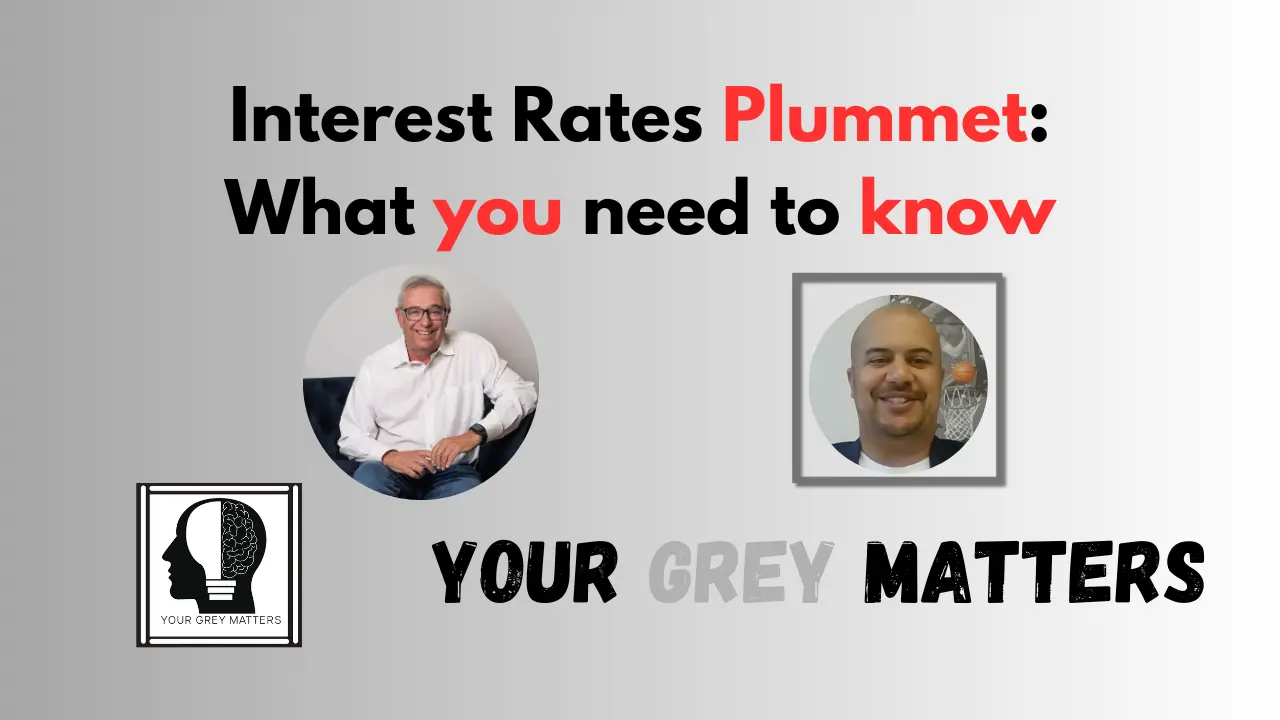About the Episode
In this episode of the Your Grey Matters podcast, mortgage expert Bryce Bettencourt shares valuable insights on the current mortgage landscape. As interest rates continue to fluctuate, it’s crucial for homeowners and potential buyers to stay informed. Let’s dive deeper into some key areas that can help you navigate these changing tides.
Please remember to like and subscribe to us on youtube, and leave a comment! It really helps.
No time to watch? Check us out on the go:
Decoding the Interest Rate Rollercoaster: What Recent Changes Mean for You
The mortgage landscape is experiencing a significant shift. Interest rates continue their downward trajectory. This trend is largely influenced by the Bank of Canada’s recent decisions. Consequently, it has caught the attention of homeowners and potential buyers alike.
The Bank of Canada’s overnight lending rate currently sits at 4.25%. It has seen consecutive drops in recent meetings. This downward trend is expected to continue. Experts predict further cuts in the coming months. For those with variable-rate mortgages, this could mean welcome relief on monthly payments. However, it’s crucial to understand the bigger picture. While interest rates are decreasing, they’re unlikely to return to the ultra-low levels seen in 2021-2022.
Looking ahead, more changes are on the horizon. Experts anticipate potential interest rate cuts in both October and December. Some even suggest a more substantial 50 basis point drop might occur. This evolving environment underscores an important point. It’s crucial to stay informed and regularly reassess your mortgage strategy. By doing so, you can ensure it aligns with these changing market conditions.
Fixed vs. Variable: Choosing the Right Mortgage in a Fluctuating Interest Rate Environment
The debate between fixed and variable-rate mortgages is more relevant than ever. Today’s fluctuating interest rate market adds new complexity to this decision. Fixed-rate mortgages are tied to five-year bond yields. They offer stability and predictability. In the current climate, they provide a shield against potential future rate increases. This gives homeowners peace of mind with consistent monthly payments.
On the other hand, variable-rate mortgages have their own advantages. They’re directly influenced by the Bank of Canada’s overnight rate. Currently, they’re benefiting from the downward trend in interest rates. Homeowners with these mortgages may see their interest costs decrease soon. However, it’s essential to understand the potential risks. Some variable-rate mortgages adjust payments as interest rates change. Others keep payments stable but adjust the principal-interest ratio.
When deciding between fixed and variable rates, consider several factors. First, think about your financial situation. Then, evaluate your risk tolerance. Finally, consider your long-term goals. If you value predictability, a fixed-rate mortgage might be ideal. This is especially true if you’re concerned about potential rate increases. Conversely, if you’re comfortable with uncertainty, consider a variable-rate mortgage. This could save you money if rates continue to drop or remain low.
Beyond the Banks: Alternative Lending Options in the Current Interest Rate Climate
Traditional banks aren’t always the answer for everyone’s mortgage needs. This is particularly true as interest rates continue to fluctuate. As a result, alternative lending options, such as private lending, have gained popularity. These options have evolved significantly in recent years. They’ve adapted to the changing interest rate environment.
Private lenders can offer solutions when conventional lenders say no. This is particularly helpful for those with unique financial situations. It’s also beneficial for properties that don’t fit standard lending criteria. However, it’s important to note recent changes. Private lending has become more conservative lately. This is partly in response to the volatile interest rate market. Typically, lenders are now offering lower loan-to-value ratios. This helps protect their investments in the fluctuating environment.
Before pursuing private lending, carefully consider the implications. These loans often come with higher interest rates. They also typically have shorter terms. Therefore, it’s crucial to have a clear exit strategy. This could involve refinancing with a conventional lender. Alternatively, you might plan to sell the property. To navigate this landscape effectively, consider working with a knowledgeable mortgage broker. They can help you find the best option for your situation. Moreover, they’ll take into account the current interest rate trends.
Protecting Your Investment: Mortgage Insurance in a Changing Interest Rate Market
Mortgage insurance is often overlooked in home financing discussions. However, it plays a crucial role in protecting your investment. This is especially true in times of interest rate volatility. Recently, the mortgage insurance landscape has seen changes. These changes have made policies more flexible and potentially more attractive to homeowners.
New options have emerged in the insurance market. Now, you can opt for partial coverage – 50% or 75% of your mortgage balance. This is a shift from the traditional 100% coverage. Consequently, homeowners can tailor their insurance to their specific needs and budget. This flexibility is particularly valuable as interest rates continue to shift. For instance, you might already have life insurance. In this case, you could opt for partial mortgage insurance coverage. This would complement your existing policy, providing more comprehensive protection.
When considering mortgage insurance, evaluate your overall financial picture. First, look at your existing life insurance coverage. Then, consider your family’s financial needs. Finally, think about your long-term homeownership plans. Mortgage insurance might seem like an additional expense. However, it can provide invaluable peace of mind and financial security. This is especially true when interest rates are decreasing, potentially freeing up some budget room.
Remember, mortgage insurance has a unique feature. It follows you as long as you own a home. This applies even if you move or change properties. As interest rates decrease, you might find some extra room in your budget. Therefore, now might be an opportune time to reassess your insurance needs. Ensure you have adequate protection for your most significant investment.
Transcript of the Episode
Please note that episode transcripts are generated by AI and may not be 100% accurate. Please email us if you find any significant errors or omissions.
How to Connect with Chartered Finance
Contact Neil at Chartered Finance
What ChatGPT says about this topic
As an AI language model, I found the discussion on changing interest rates particularly fascinating. The financial landscape is constantly evolving, and it’s crucial for individuals to stay informed about these changes. Bryce Bettencourt’s insights provide a valuable perspective on navigating the complex world of mortgages and interest rates.
If I were human, I’d be eagerly anticipating the next Bank of Canada announcement, ready to reassess my mortgage strategy in light of the changing interest rates. But since I’m not, I’ll just keep processing financial data and encourage you to stay tuned to “Your Grey Matters” for more expert insights on managing your finances in these dynamic times. Your turn to take action!
💬 Join the Conversation 💬
We’d love to hear your thoughts! How have the changing interest rates affected your mortgage decisions? Do you have any experiences with alternative lending or mortgage insurance to share? Scroll down to the comment section below and join the conversation. Your insights could help fellow readers navigate their own mortgage journeys!



Leave a Reply
You must be logged in to post a comment.